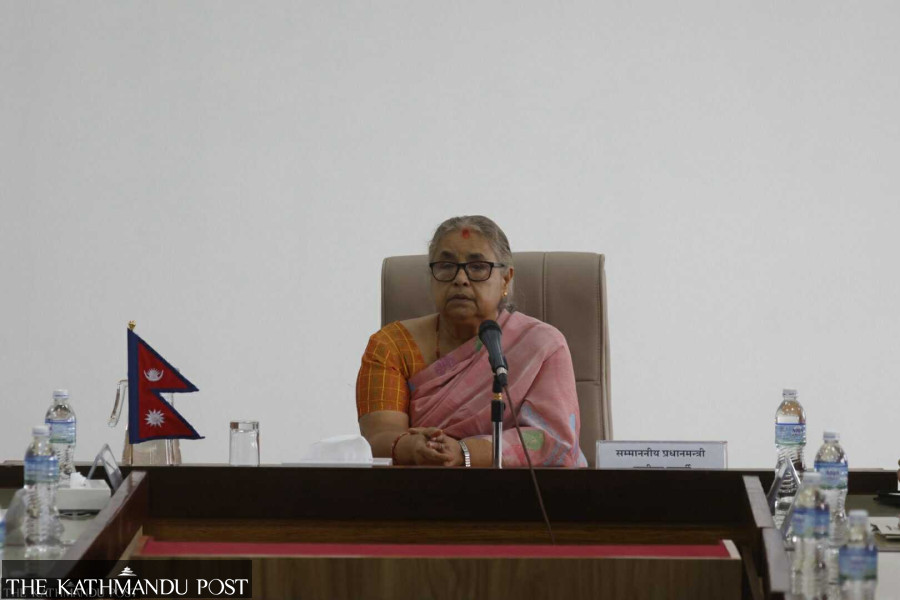National
Interim government faces domestic turmoil and foreign challenges
Experts say restoring political stability, managing foreign relations, and rebuilding confidence in key sectors like tourism will test the new government.
Anil Giri
In the aftermath of the Gen Z movement, an entirely new political dispensation has emerged in the country, bringing with it many challenges both domestically and externally.
A new government has formed under the leadership of former chief justice Sushila Karki, and a three-member Cabinet has been constituted. But who will be the foreign minister is still unknown. Sources say the government is approaching some former secretaries and ambassadors for the role, but no decision has been made yet.
Whosoever takes the helm of the foreign ministry will face a myriad of challenges.
Besides holding elections on March 5, 2026 and rebuilding the hundreds of infrastructures damaged and destroyed during the recent Gen Z demonstrations, the new government must also navigate several other external challenges.
Experts in international relations said the support of immediate neighbours India and China, as well as major and middle powers like the US, EU, UK, Japan, and Korea, will be crucial for holding credible elections. Managing geopolitical concerns that affect Nepal’s foreign policy conduct and mobilising international support for reconstruction will also be key tasks for the new government and foreign minister.
As soon as the new government was formed and Karki was sworn in as prime minister, she received widespread support and best wishes to fulfill the government’s objectives of conducting free and fair elections and creating a stable political environment. Some experts also pointed out how things went wrong in the past and the country arrived in the current difficult situation.
Failure to correctly assess external situations, including emerging geopolitical trends, and to adapt to changing circumstances, puts a country’s foreign policy at risk, said Shankar Das Bairagi, former adviser to the National Security Council, former chief secretary as well as foreign secretary. He compared major foreign policy mistakes to a pilot’s fatal error.
“Conducting foreign policy is a two-way traffic. We have to understand how others perceive us,” Bairagi said. “We have failed to assess the behaviour of external forces and friends. Our missions should have strategies and information on the changing dynamics of host countries. Our foreign policy has started being dictated by others’ policies and attitudes, which is partly responsible for the current mess.”
Some foreign policy experts believe geopolitical factors might also have contributed to the recent political changes, and say the new government must address these underlying issues.
“The way the new prime minister received congratulatory messages, including from the Dalai Lama, has raised public suspicion,” said Mrigendra Bahadur Karki, executive director at the Center for Nepal and South Asian Studies (CNAS), Tribhuvan University.
“Removing this geopolitical ambiguity is a key challenge for the new government. How China perceives these changes, how we balance our engagement with India, China and the US, and how we navigate this safely is a major task. We need huge external support for rebuilding, but seeking support from only one side, either India or China, could disrupt our foreign policy,” said Karki.
Some experts stress the need to restore confidence in tourism, one of Nepal’s key economic backbones, which was recovering after the Covid pandemic but could be affected by recent protests.
“November-December is the peak tourist season. We must restore confidence that Nepal is rising again,” said Nishchal N Pandey, the director of the Centre for South Asian Studies (CSAS), a Kathmandu-based think tank.
Winning the confidence of the international community for rebuilding Nepal is essential, says CD Bhatta, a political scientist and geopolitical analyst.
CNAS’s Karki also believes former prime minister Oli’s geopolitical adventurism is responsible for today’s situation.
Oli’s decision to take part in a military parade in China, seen as hostile by Japan, was ill-advised as Japan is Nepal’s long-term development partner.
Oli had recently visited China to attend the 25th Summit of the Shanghai Cooperation Organization and held talks with Chinese President Xi Jinping and Russian President Vladimir Putin, among other leaders.
“If we do not manage domestic politics carefully, the situation could deteriorate further,” said Bhatta.
“As this government has come from street protests, it must ensure good relations with both neighbours and beyond. External challenges depend on internal political dynamics. Also, as an interim government, it will have a limited role in shaping foreign policy,” he said.




 15.12°C Kathmandu
15.12°C Kathmandu















